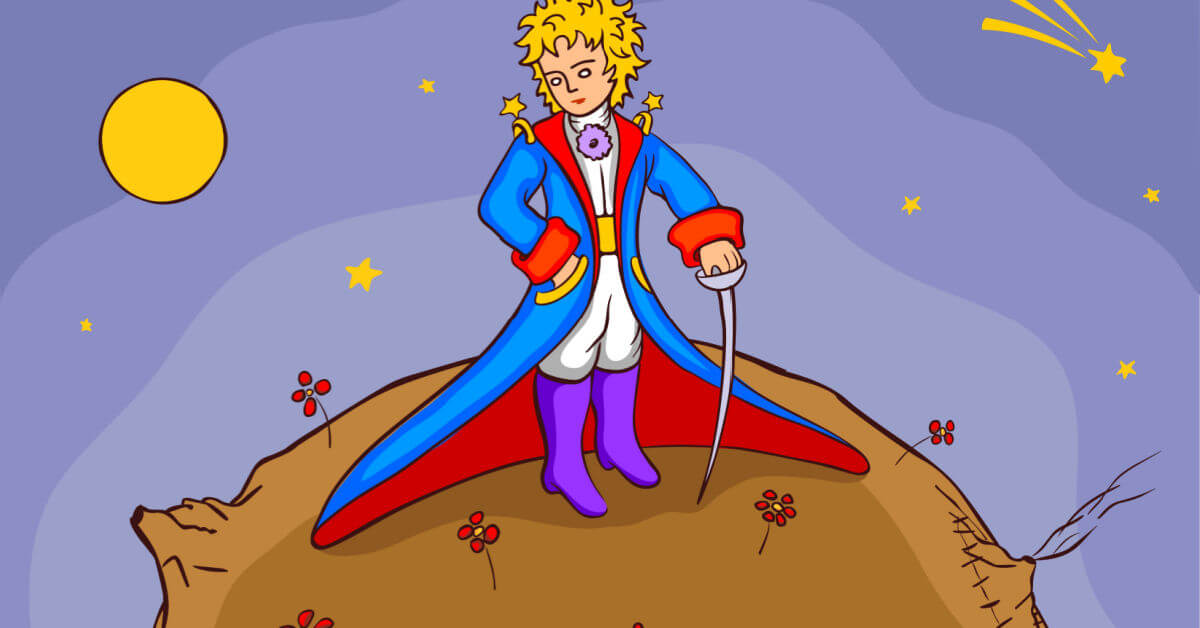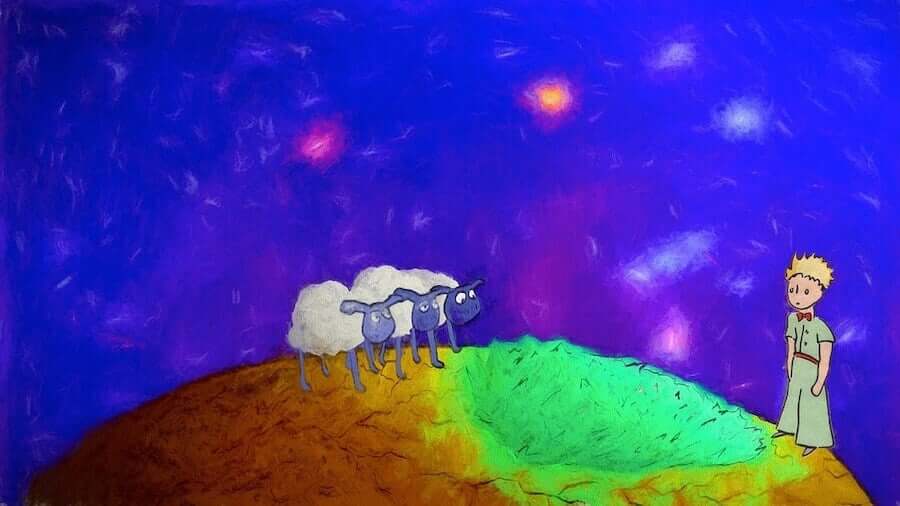The Little Prince: More than a Children's Story


Reviewed and approved by the psychologist María Alejandra Castro Arbeláez
The Little Prince is one of the most translated literary works. We can find it in more than 200 languages, including a version in braille. The teachings of The Little Prince have provided great insight into humanity and our society.
With its contrasts between light and shadows, greed and love, that which is material and that which is essential… this 75-year-old book continues to be more relevant than ever, and continues to move both children and adults.
Have you read The Little Prince?
At first glance, The Little Prince is considered to be children’s literature. Just the same, it’s full to the brim with philosophical questions regarding loneliness, love and the meaning of life. The author addresses each of these themes in a way that is subtle and easy to understand.
For this reason, The Little Prince is one of those books that you can read over and over again. And each time you do, whether you’re a child or an adult, you’ll discover new lessons in its dialogues.
The author: Antoine de Saint-Exupéry
The novel’s author, Antoine de Saint-Exupéry, dedicated his life to aviation during his exile in the United States at the beginning of World War II. A deep personal crisis drove him to re-evaluate basic issues related to humanity. And he expressed his thoughts, doubts and wisdom masterfully on each page of The Little Prince.

5 passages from The Little Prince that are full of wisdom
1. “It is only with the heart that one can see rightly; what is essential is invisible to the eye.”
We live in a world that measures our value by what we have and where material possessions are everything. But The Little Prince reminds us that what really matters can’t be measured. And it’s in those things that we find true happiness.
2. “I have no need of you. And you, on your part, have no need of me… But if you tame me, then we shall need each other. To me, you will be unique in all the world. To you, I shall be unique in all the world.”
One of the most beautiful moments in this story is when the fox and the Little Prince become friends. Here we learn that when you love someone, you become responsible for one another.
Even though you know that you can be without one another, you still care for one another. You value one another and help each other grow, because you appreciate their presence in your life.
3. “It is much more difficult to judge oneself than to judge others. If you succeed in judging yourself rightly, then you are indeed a man of true wisdom.”
Self-awareness is one of the key factors in personal growth. Knowing what our strengths and weakness are gives us the opportunity to grow and to become better people.
This is one of the key teachings we discover in The Little Prince that invites us to take a hard look at ourselves and reflect before we look at others.

The Little Prince, a story that reinforces and brings back values
4. “I ought to have judged her according to her actions, not her words. She perfumed my planet and lit up my life… I ought to have realized the tenderness underlying her silly pretensions. Flowers are so contradictory! But I was too young to know how to love her.”
When the Little Prince remembers the rose that he abandoned on his planet, he regrets not having recognized her value. This is a typical human behavior – thus the refrain: “You don’t know what you have until it’s gone.”
We want others to fulfill our own expectations. Therefore, we fail to build relationships that allow us to appreciate the love that others give us.
5. “Love does not consist of gazing at each other, but in looking outward together in the same direction.”
If we only look at those we love, then we only end up complaining about everything they do. We never manage to build anything. The Little Prince reminds us that we need to take one another’s hand and face the same direction. That way, together, we can resist whatever comes our way.
The Little Prince is one of the most translated literary works. We can find it in more than 200 languages, including a version in braille. The teachings of The Little Prince have provided great insight into humanity and our society.
With its contrasts between light and shadows, greed and love, that which is material and that which is essential… this 75-year-old book continues to be more relevant than ever, and continues to move both children and adults.
Have you read The Little Prince?
At first glance, The Little Prince is considered to be children’s literature. Just the same, it’s full to the brim with philosophical questions regarding loneliness, love and the meaning of life. The author addresses each of these themes in a way that is subtle and easy to understand.
For this reason, The Little Prince is one of those books that you can read over and over again. And each time you do, whether you’re a child or an adult, you’ll discover new lessons in its dialogues.
The author: Antoine de Saint-Exupéry
The novel’s author, Antoine de Saint-Exupéry, dedicated his life to aviation during his exile in the United States at the beginning of World War II. A deep personal crisis drove him to re-evaluate basic issues related to humanity. And he expressed his thoughts, doubts and wisdom masterfully on each page of The Little Prince.

5 passages from The Little Prince that are full of wisdom
1. “It is only with the heart that one can see rightly; what is essential is invisible to the eye.”
We live in a world that measures our value by what we have and where material possessions are everything. But The Little Prince reminds us that what really matters can’t be measured. And it’s in those things that we find true happiness.
2. “I have no need of you. And you, on your part, have no need of me… But if you tame me, then we shall need each other. To me, you will be unique in all the world. To you, I shall be unique in all the world.”
One of the most beautiful moments in this story is when the fox and the Little Prince become friends. Here we learn that when you love someone, you become responsible for one another.
Even though you know that you can be without one another, you still care for one another. You value one another and help each other grow, because you appreciate their presence in your life.
3. “It is much more difficult to judge oneself than to judge others. If you succeed in judging yourself rightly, then you are indeed a man of true wisdom.”
Self-awareness is one of the key factors in personal growth. Knowing what our strengths and weakness are gives us the opportunity to grow and to become better people.
This is one of the key teachings we discover in The Little Prince that invites us to take a hard look at ourselves and reflect before we look at others.

The Little Prince, a story that reinforces and brings back values
4. “I ought to have judged her according to her actions, not her words. She perfumed my planet and lit up my life… I ought to have realized the tenderness underlying her silly pretensions. Flowers are so contradictory! But I was too young to know how to love her.”
When the Little Prince remembers the rose that he abandoned on his planet, he regrets not having recognized her value. This is a typical human behavior – thus the refrain: “You don’t know what you have until it’s gone.”
We want others to fulfill our own expectations. Therefore, we fail to build relationships that allow us to appreciate the love that others give us.
5. “Love does not consist of gazing at each other, but in looking outward together in the same direction.”
If we only look at those we love, then we only end up complaining about everything they do. We never manage to build anything. The Little Prince reminds us that we need to take one another’s hand and face the same direction. That way, together, we can resist whatever comes our way.
All cited sources were thoroughly reviewed by our team to ensure their quality, reliability, currency, and validity. The bibliography of this article was considered reliable and of academic or scientific accuracy.
- de Saint-Exupéry, A. (1943). El principito. Emecé Editores.
- López Valero, A., Encabo Fernández, E., & Moreno Muñoz, C. (2002). Esencias de un <>. Didáctica de la literatura y valores. Didáctica. Lengua y Literatura.
- Link, D. (2015). INFÂNCIA. Alea : Estudos Neolatinos. https://doi.org/10.1590/1517-106x/172-199
This text is provided for informational purposes only and does not replace consultation with a professional. If in doubt, consult your specialist.








